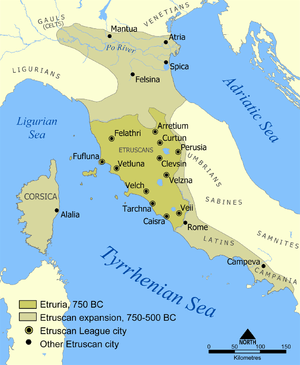Etruria
Etruria (/ɪˈtrʊəriə/; usually referred to in Greek source texts as Tyrrhenia, Ancient Greek: Τυρρηνία) was a region of Central Italy, located in an area that covered part of what are now Tuscany, Lazio, and Umbria.

Etruscan Etruria
The ancient people of Etruria are labeled Etruscans. Their complex culture was centered on numerous city-states that rose during the Villanovan period in the ninth century BC, and they were very powerful during the Orientalizing Archaic periods. The Etruscans were a dominant culture in Italy by 650 BC,[1] surpassing other ancient Italic peoples such as the Ligures, and their influence may be seen beyond Etruria's confines in the Po River Valley and Latium, as well as in Campania and through their contact with the Greek colonies in Southern Italy (including Sicily). Indeed, at some Etruscan tombs, such as those of the Tumulus di Montefortini at Comeana (see Carmignano) in Tuscany, physical evidence of trade with Egypt has been found—fine faience ware cups are an example. Such trade occurred either directly with Egypt or through intermediaries such as Greek or Phoenician sailors.
Rome, separated from Etruria by the Silva Ciminia, the Ciminian Forest, was influenced strongly by the Etruscans, with a series of Etruscan kings ruling at Rome until 509 BC when the last Etruscan king Lucius Tarquinius Superbus was removed from power and the Roman Republic was established.[2] The Etruscans are credited with influencing Rome's architecture and ritual practice; it was under the Etruscan kings that important structures such as the Capitolium, Cloaca Maxima, and Via Sacra were realized.
The Etruscan civilization was responsible for much of the Greek culture imported into early Republican Rome, including the twelve Olympian gods, the growing of olives and grapes, the Latin alphabet (adapted from the Greek alphabet), and architecture like the arch, sewerage and drainage systems.
Territorial subdivision of Etruria
Etruria is usually divided into two main territories, called Northern Etruria and Southern Etruria, to which must be added the northernmost territories, called Etruria Padana, and the southernmost territories called Etruria Campana.
- Northern Etruria. Much of modern Tuscany, from the Arno river to the north, the Apennines to the east, and the Albegna river to the south of Tuscany. Furthermore, the Etruscan territories up to Perugia in modern Umbria.
- Southern Etruria. Small portions of the most southern areas of Tuscany, all of northern and central Lazio to the gates of Rome.
- Etruria Padana (Padanian Etruria). Territories in Emilia-Romagna and in the southern extremity of Lombardy and Veneto, in northern Italy.
- Etruria Campana (Campanian Etruria). Some territories in the Campania region of southern Italy.
Roman Etruria
In the Augustan organization of Italy, Etruria was the name of a region (Regio VII), whose borders were the Tiber, the Tyrrhenian Sea, the Apuan Alps and the Apennines, roughly coincident with those of pre-Roman Etruria.[3]
Etruria in later times
The Grand Duchy of Tuscany (which existed 1569–1801 and 1814–1859) styled itself in Latin as Magnus Ducatus Etruriae (Grand Duchy of Etruria). The name Etruria was also applied to the Kingdom of Etruria, an ephemeral client state of Napoleon I of France which replaced the Grand Duchy between 1801 and 1807.
A particularly noteworthy work dealing with Etruscan locations is D. H. Lawrence's Sketches of Etruscan Places and other Italian essays.
Cities
Latin and Italian names are given between parentheses:
- Arritim (Arretium, Arezzo)
- Atria (Adria)
- Caisra (Caere, Cerveteri)
- Clevsin (Clusium, Chiusi)
- Curtun (Cortonium, Cortona)
- Felathri (Volaterrae, Volterra)
- Fufluna (Populonium, Populonia)
- Parusia (Perusia, Perugia)
- Tarchna (Volscian Anxur) (Tarracina, Terracina)
- Tarchnal (Tarquinii, Tarquinia)
- Veii (Veii, Veio)
- Vetluna (Vetulonium, Vetulonia)
- Vipsul (Faesulae, Fiesole)
- Velch (Vulci, Volci)
- Velzna (Volsiniia, Volsinii)
There was a period between 600 BC and 500 BC, in which 12 Etruscan city-states formed a loose confederation known as the Etruscan League. Etruscan was the official language for meetings. When Etruria was conquered by the Roman Republic, Latin became the official language.
See also
References
- Rix, Helmut. "Etruscan." In The Ancient Languages of Europe, ed. Roger D. Woodard. Cambridge University Press, 2008, pp. 141–164.
- Cary, M.; Scullard, H. H., A History of Rome. Page 28. 3rd Ed. 1979. ISBN 0-312-38395-9.
- Baracca, M. (1970). Atlante Storico (in Latin). Novara: De Agostini. p. 15.
Bibliography
- Bonfante, Giuliano; Bonfante, Larissa (2003). The Etruscan Language: an Introduction. Manchester: Manchester U.P. ISBN 0719055407.
- Hall, John F., ed. (1996). Etruscan Italy: Etruscan Influences on the Civilizations of Italy from Antiquity to the Modern Era. Indiana University Press. ISBN 9780842523349. Chronology of Etruscan Italy, .
External links
| Look up etruria in Wiktionary, the free dictionary. |
- Cities and Cemeteries of Etruria, by George Dennis, an overview of Etruscan civilisation
- . Encyclopædia Britannica (11th ed.). 1911.
